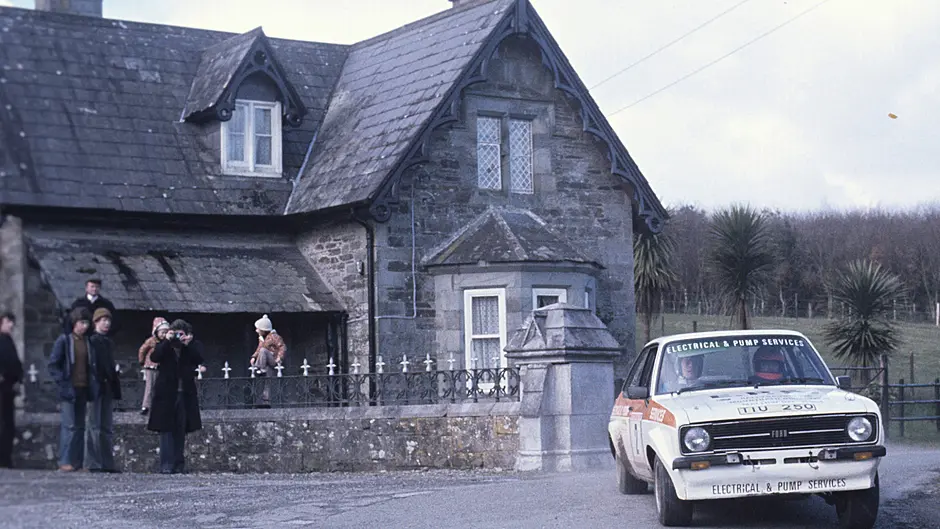BY MARTIN WALSH
IN modern-day parlance Clonakilty’s Martin Kingston would be described as a facilitator.
Flicking back some 45 years he was the conduit between the Festival of West Cork Committee and the Cork Motor Club where, after a number of meetings, a deal was brokered that culminated in the maiden West Cork Rally in 1977.
It’s one of the success stories in terms of the fusion of sport and tourism.
Long before it was fashionable or more importantly, key to progress, local support was very much part of the whole concept.
Essentially, the West Cork Rally is and will remain a clubman rally; that is one of its keystones.
However, and very much in recent times, it has also shown its desire to move with the changing demographic in motorsport, illustrated by its inclusion in the Irish Tarmac Rally Championship and more recently, part of the British Rally Championship – the only event in the 26 counties to gain such inclusion.
So how did it all begin? Once upon a time there was only one club in Cork county that was affiliated to then RIAC (Royal Irish Automobile Club), the governing body of Irish motorsport.
That club was the Munster Motor Cycle and Car Club (MMC& CC). It had car, bike and karting sections and was based at Vernon Mount, a demesne that included Mount Vernon House that was built circa 1780-1790 for a merchant prince and his family. Sadly, the building was burned down in 2016 and an architectural gem was lost.
In the 1970s Mount Vernon House was used by the MMC&CC for club meetings. Its location was fondly referred to as ‘The Hill.’ One such meeting in the early 1970s led to a dispute between the motorcycle and car sections of the MMC&CC that saw several members of the car section leave. Within a short space of time, the Cork Motor Club was born.
Martin Kingston, who was previously involved with the MMC&CC, picks up those early beginnings.
‘We had a meeting in the Inglenook in Blarney and after approaching other clubs in the province (Munster), the club got some dates and then applied to the RIAC for affiliation. Finding a way of generating funds was the principal aim and it was decided to organise a two-day rally and make some money,’ Kingston explains.
The meetings were very well attended and many views were expressed including approaching interests in Kinsale, Blarney, Cork City and hotels such as the Silver Springs, the Metropole Hotel and the Imperial Hotel. But according to Kingston, ‘there was no real concrete proposal.’
At that time, he was working in Cork with Spar, developing its stores brand and returning to Clonakilty at weekends.
‘As was the norm, I would go in to Danny O’Donovan’s (green grocer) store in Ashe Street, actually to buy free-range chicken for my mother for the Sunday dinner.’
Kingston outlined that at that time Danny was chairman of the Festival of West Cork Committee and his side-kicks were John Lowney and also Justin Houlihan and Jimmy Blewitt, both now deceased.
‘Danny said to me they had a void in events from September until May,’ Kingston says.
Now called the shoulder season, O’Donovan and his committee were keen to grow and bolster the tourism product and a rally would fill some of that void.
Subsequently, Kingston took the idea back to Blarney for another meeting of the Cork Motor Club. But – and bearing in mind this was the mid 1970s – the response wasn’t great.
‘There was a great degree of scepticism from many that considered that Clonakilty was somewhere in the back of beyonds and also highlighting its lack of accommodation and also thinking that the locals didn’t really know what a rally was all about,’ Kingston says.
For about six meetings a determined Kingston kept floating the Clonakilty idea until eventually club chairman Dick O’Brien, acknowledging his unwavering efforts, thought it would only be courteous for a delegation to make the trip to Clonakilty to see what they had to say and what was on offer.
Kingston arranged the meeting and the aforementioned Clonakilty quartet met with the Cork Motor Club group that included Dick O’Brien, Declan Mullally and Ger O’Sullivan with Kingston setting out the agenda at the Emmet Hotel.
‘The Cork MC lads were impressed but like in most things, it came down to money and O’Donovan asked, “What’s the bottom line?” I can’t recall the actual amount that was suggested but within a milli-second Danny promised a figure of 20 percent more with the stipulation that it had to be a top-class two-day event. The deal was done, more or less.’
O’Donovan and some of the committee went fundraising and promoting while Kingston and John Lowney were already hatching plans on attracting top rally teams. Concerns about accommodation evaporated, as Kingston explains.
‘The accommodation was sorted very quickly as nearly every house in West Cork became a B&B for the rally weekend, usually for five or six days. People slept in sitting rooms and on kitchen floors while the hotels and guesthouse were all full up in Clonakilty, Inchydoney, Rosscarbery, Ownahincha and Courtmacsherry,’ he says.
‘The event was a huge success from day one. I think a lot of that was due to the fact that the Cork Motor Club really put on a good show, good stages (Tragumna, Church Cross, Union Hall, Glandore and Rosscarbery) and everything ran on time.’
Of course, it was fitting that Billy Coleman won the first event.
‘He was a class act,’ Kingston says, with the same type of aplomb as the Millstreet man’s ability. Fellow Corkonians Mick O’Connell (1978), Ger Buckley (1979) and Coleman again (1980) were next on the winning ramp before Tony Pond became the first overseas winner in 1981.
‘Pond’s victory really boosted the West Cork Rally brand,’ Kingston says.
Down through the years there has been some notable milestones like in 1988 when Dunmanway’s Donal O’Donovan and Drimoleague’s Pat Lordan (Ford Sierra Cosworth) became the first local crew to win the rally. The fact that Keohane Readymix were the title sponsors added even more to the occasion. For Kingston, it was extra special as he was chairman of the Clonakilty Urban District Council at the time.
‘It was great to honour Donal and Pat with a civic reception. They were very talented. Paddy (Keohane) was a great sponsor, a great supporter too, not just in terms of overall sponsor but behind the scenes as well and also with so many other drivers,’ he says.
‘Of course, we had other local winners too like Liam McCarthy and Denis Cronin. Frank O’Mahony was another popular local, he came close to winning several times. It was ironic that his son Brian won it (2013) the first time he competed in a car capable of victory. Locals in all the various classes were and still are also very important.’
In terms of headquarters, the event first based at Inchydoney has also headquartered at Ownahincha, Fernhill House and since 2003 at the Quality Hotel, now Clonakilty Park Hotel.
Its inclusion in the Irish Tarmac Rally Championship was boosted by Clonakilty Blackpudding’s underpinning of the ITRC and there is no doubt that the event is now one of the best in that series. Its inclusion as a round of the British Rally Championship is further proof of its status. Certainly, the West Cork Rally brand is highly regarded.
The decision – by the Cork Motor Club in consultation with the Clonakilty West Cork Rally Committee – to cancel this year’s rally was certainly the right call.
‘The measure of the agreement with the decision was the overwhelming agreement of all the stakeholders to put the money towards next year’s event. I think when you have up-front contact with people you foster a great relationship,’ Kingston says.
With the Covid-19 situation still prevailing, a decision for the 2021 event will be made early in the new year and it’s evident what will be done will be in the best interests of Clonakilty. It was the same in the beginning.









